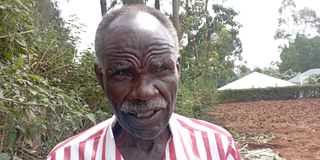Help us get land, family of 'Kenya Yetu' composer appeals as he's buried

Zachariah Kekongo, 70. The brother of songwriter Enock Ondego speaking during the burial of the veteran musician at Matsigulu village in Central Maragoli, Vihiga County on March 13. He said the brother died a landless person.
The composer of “Kenya Yetu” song Enock Ondego has been buried in Central Maragoli, Vihiga in a low key ceremony attended by villagers.
The 90-year-old man born in Matsigulu village, who rose to national fame in the 1960s, has however, left a landless family, prompting a barrage of appeals for the government to help settle the family, largely the grandchildren.
On Monday, his brother, Mr Zachariah Kekongo, 70, said the family is wondering where his children and grandchildren would build their houses.
They're appealing to the government to get him land, posthumously, as an honour to the hero.
Ondego, one of Kenya’s most prominent patriotic songwriters, died on February 26 after suffering a stroke in his house in Kisauni, Mombasa County, where he moved to in the 1960s.
While he had land at his ancestral home, staying away for many years made one of his brothers, now deceased, illegally sell off his parcel, leaving him landless.
It remains unclear whether the land will be repossessed, but the family, through Mr Kekongo, said a land reward would be a fitting honour for their brother.
Ondego composed the famous "Wimbo wa Historia" and "Kenya Yetu” patriotic songs that are still relevant to date.
Not many young Kenyans knew about him and his burial did not come with the fanfare that decorates such funerals; it was low key.
Ondego’s first-born, Michael Ondego, said his father died a sad and depressed man.
“He lived a miserable life. My father fought for the copyright of his songs but it was all in vain and to date, he has not been paid a penny from them despite the songs being played during national celebrations,” he said.

The burial site of songwriter Enock Ondego , 90, on Monday. It was a low key ceremony held at Matsigulu village, Central Maragoli, Vihiga County. The family is pleading for government help to get land in honour of the fallen hero.
Ondego lost a case he had filed at the Mombasa Law Courts seeking compensation for the copyright of his songs.
Mr Kekongo said Ondego’s adult children are jobless and cannot raise money to get land to build houses even as their father’s work continues to be popular.
"We are calling on the government to help us get land that will help those who depended on him … because he was a hero who was forgotten in his lifetime."
"My brother's children are not in any formal employment. They cannot raise money to buy land for themselves," added Mr Kekongo, noting that the family is pained by how Ondego lived despite the fame the country received through the songs he composed.
Ondego had married three wives, two of whom are deceased, and leaves behind six children and 27 grandchildren.
"It is unfortunate he died a poor man yet his songs are famous and exhibit a lot of patriotism. Other people are using the songs.
CBC Curriculum
We have been told his songs are being taught in schools under the new Competence Based Curriculum. The family should be given land as an honour to the hero," said Mr Kekongo.
His songs stir up memories of the liberation struggle and are usually played during national celebrations such as Jamhuri Day and Madaraka Day.
Born in Mazigolo in 1934, Ondego started teaching at Mukingi primary school in Vihiga County when he was 17.
It is here that his work in music started, Mr Kekongo said, propelling him to national status.
He was transferred to Samburu Primary school in Kwale County, and he set up base at the Coast.
While in Kwale, he brought together students and formed the popular Mwakigwena Choir that impressed Kenya's first President Mzee Jomo Kenyatta.
Mzee Kenyatta picked Ondego to head the Presidential Music Association in 1969, a move that helped him to record the song "Kenya ni Nchi ya Ajabu".
Early this month, his family told Nation during an interview in Mombasa that despite the close ties with Mzee Kenyatta, Ondego lived a life full of despair for the past five decades.
Ondego’s daughter in-law, Roseline Olwanyi, told the Nation that the renowned teacher was in good health until he received a disturbing phone call from the county commissioner’s office in Mombasa two days before he died.
“He was a joyful person, always trying to extend happiness to those around him. However, two days before he suffered a stroke, my father-in-law received a call in which he was asked to vacate the house by February 28. Upon hanging up the phone, Ondego started sweating and shivering,” said Ms Olwanyi.
She explained that the house Ondego lived in cost Sh6,000 in rent a month, paid by the government yearly.
“After the news, he became bedridden and could not move around. The next day another call came, this time it was the agent of the house relaying the same message, that he should move out in the next two days as the government had distanced itself from paying his rent anymore,” said Ms Olwanyi.
The family used to run a hotel but it collapsed during the Covid-19 pandemic, Ms Olwanyi added.





